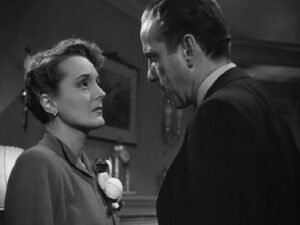by James Scott Bell
@jamesscottbell
 My favorite era of publishing is the post-war mass market paperback boom of the 1950s. Here was a galaxy of genre fiction, from hardboiled detectives like Mike Hammer and Shell Scott, to standalone crime fiction from the “red-hot typewriter” of John D. MacDonald and a slew of others. And the covers! Oh, those glorious covers, with just enough salaciousness to catch the eye, but not enough to get the book placed in brown paper at the far end of the newsstand (what they used to call “smut”).
My favorite era of publishing is the post-war mass market paperback boom of the 1950s. Here was a galaxy of genre fiction, from hardboiled detectives like Mike Hammer and Shell Scott, to standalone crime fiction from the “red-hot typewriter” of John D. MacDonald and a slew of others. And the covers! Oh, those glorious covers, with just enough salaciousness to catch the eye, but not enough to get the book placed in brown paper at the far end of the newsstand (what they used to call “smut”).
I have a story about that. When I was a kid I read many of the classics well ahead of my classmates. I mean, I read Moby-Dick, The Count of Monte Cristo, David Copperfield, A Tale of Two Cities, Les Misérables, The Last of the Mohicans,The Hunchback of Notre Dame and other such like. Full disclosure: these were in the form of Classics Illustrated comic books. Those gems were written with great care to be true to the source material.
I made regular trips on my bike to Sipe’s Market and Green’s Drugstore to buy these comics, along with Archie, Superman, and Batman. And then I’d spend a little time at the spinner racks of paperbacks. At the time, the early to mid-60s, secret agents were hot. Not only James Bond, but also the hit TV show The Man From U.N.C.L.E. (I still remember what that stood for: United Network Command for Law and Enforcement.)
So one day I was spinning a rack and came upon a series I didn’t know. The title was The Man From O.R.G.Y.
Cool, thought I. A new secret agent! I brought it to the cash register. But the man took one look and said, “This is not for you, son.”
“But I have the money,” I said.
“I’m not going to sell it to you,” he said, then added, “You can ask your parents why.”
Which I did. My mom delicately, oh so delicately, informed me that this was inappropriate for kids, and that the abbreviation stood for something “bad” that adults did. Later, in the schoolyard, I found out from a classmate what that bad thing was. Sheesh! Adults did that? Gross!
But my love of paperbacks was firmly established. Much later, when pursuing a writing career, I would scour used bookstores for titles from the classic era of Fawcett Gold Medal, Bantam, Dell and others. I eventually acquired a full set of all the 1950s stand-alones by the great John D., and bunches from other writers of the time. They are on my shelves now.
 My own early books came out in trade paperback size, then hardcover. But I always wanted to be in MM. I realized my dream when I got a three-book contract with Kensington for the first (and only?) zombie legal thriller series, written under the nom de plume K. Bennett. I have the rights back and publish them under my own name, with new covers…though I wish I had rights to the old ones!)
My own early books came out in trade paperback size, then hardcover. But I always wanted to be in MM. I realized my dream when I got a three-book contract with Kensington for the first (and only?) zombie legal thriller series, written under the nom de plume K. Bennett. I have the rights back and publish them under my own name, with new covers…though I wish I had rights to the old ones!)
That’s why it is sad to hear about the imminent death of the format. In the Substack Inside Agenting by the noted literary agent Richard Curtis, he writes:
[Mass market paperbacks] are scheduled to die at the end of this year.
Their death notice was recently announced in Publishers Weekly: “Sales of mass market paperbacks have steadily declined in recent years, to the point where they accounted for only about 3% of units sold at retailers that report to Circana BookScan in 2024. The format will take another big blow at the end of 2025, when Readerlink will stop distributing mass market paperbacks to its accounts.” ReaderLink describes itself as “the largest full-service distributor in North America” with six U.S. distribution centers supplying over 100,000 stores. All major publishers are shifting their focus to trade paperback as the format of choice both for originals and reprints. Even paperback publishers that prospered with genre literature like romance and science fiction are pushing their chips onto the larger trim size.
The reasons for this demise are:
- Tissue-thin profit margins. Publication and distribution has become exceedingly cost-ineffective compared to other (and higher priced) print formats like hardcover and trade paperback.
- The gradual disappearance of paperback racks and other displays in drugstores and supermarkets, and the explosive growth of chain bookstores whose bookshelves do not display MMPBs as effectively as trade paperbacks.
- The decline of book departments at big-box stores like Walmart, where paperbacks failed to meet the test of profitability per square foot of display space compared to other consumer goods like deodorant and panty hose.
- The rise of e-books as a preferred reprint format. Because e-books are released simultaneously with hardcover editions, as opposed to mass market paperbacks which are traditionally issued a year or longer after a book’s first edition, e-books have a huge advantage over MMPBs. Plus e-books are cheaper.
The one thing that never changes is change, right? But we writers are corks on the surface of the roiling sea of publishing upheavals, surviving, because no matter the format we have what the world needs—stories. And good stories, with actual human voice, will find their place. Always.
What has been your relationship with mass market paperbacks?



